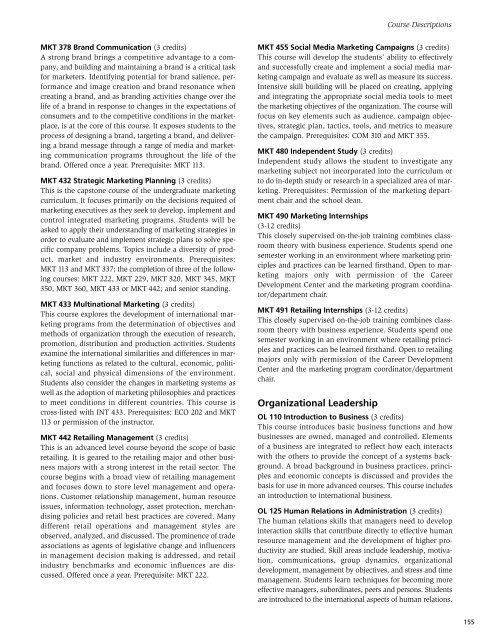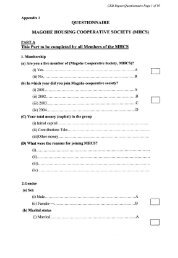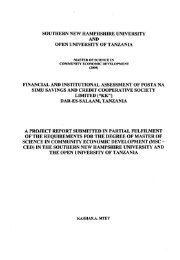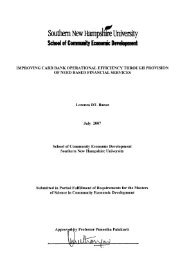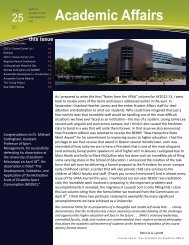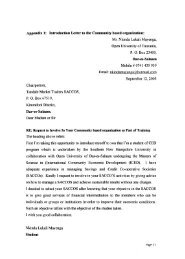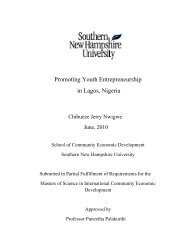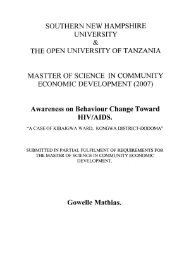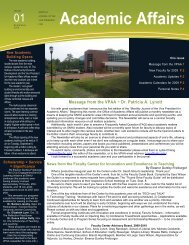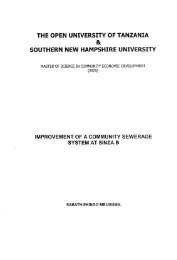Undergraduate Catalog 2010-2011 - SNHU Academic Archive ...
Undergraduate Catalog 2010-2011 - SNHU Academic Archive ...
Undergraduate Catalog 2010-2011 - SNHU Academic Archive ...
Create successful ePaper yourself
Turn your PDF publications into a flip-book with our unique Google optimized e-Paper software.
Course Descriptions<br />
MKT 378 Brand Communication (3 credits)<br />
A strong brand brings a competitive advantage to a company,<br />
and building and maintaining a brand is a critical task<br />
for marketers. Identifying potential for brand salience, performance<br />
and image creation and brand resonance when<br />
creating a brand, and as branding activities change over the<br />
life of a brand in response to changes in the expectations of<br />
consumers and to the competitive conditions in the marketplace,<br />
is at the core of this course. It exposes students to the<br />
process of designing a brand, targeting a brand, and delivering<br />
a brand message through a range of media and marketing<br />
communication programs throughout the life of the<br />
brand. Offered once a year. Prerequisite: MKT 113.<br />
MKT 432 Strategic Marketing Planning (3 credits)<br />
This is the capstone course of the undergraduate marketing<br />
curriculum. It focuses primarily on the decisions required of<br />
marketing executives as they seek to develop, implement and<br />
control integrated marketing programs. Students will be<br />
asked to apply their understanding of marketing strategies in<br />
order to evaluate and implement strategic plans to solve specific<br />
company problems. Topics include a diversity of product,<br />
market and industry environments. Prerequisites:<br />
MKT 113 and MKT 337; the completion of three of the following<br />
courses: MKT 222, MKT 229, MKT 320, MKT 345, MKT<br />
350, MKT 360, MKT 433 or MKT 442; and senior standing.<br />
MKT 433 Multinational Marketing (3 credits)<br />
This course explores the development of international marketing<br />
programs from the determination of objectives and<br />
methods of organization through the execution of research,<br />
promotion, distribution and production activities. Students<br />
examine the international similarities and differences in marketing<br />
functions as related to the cultural, economic, political,<br />
social and physical dimensions of the environment.<br />
Students also consider the changes in marketing systems as<br />
well as the adoption of marketing philosophies and practices<br />
to meet conditions in different countries. This course is<br />
cross-listed with INT 433. Prerequisites: ECO 202 and MKT<br />
113 or permission of the instructor.<br />
MKT 442 Retailing Management (3 credits)<br />
This is an advanced level course beyond the scope of basic<br />
retailing. It is geared to the retailing major and other business<br />
majors with a strong interest in the retail sector. The<br />
course begins with a broad view of retailing management<br />
and focuses down to store level management and operations.<br />
Customer relationship management, human resource<br />
issues, information technology, asset protection, merchandising<br />
policies and retail best practices are covered. Many<br />
different retail operations and management styles are<br />
observed, analyzed, and discussed. The prominence of trade<br />
associations as agents of legislative change and influencers<br />
in management decision making is addressed, and retail<br />
industry benchmarks and economic influences are discussed.<br />
Offered once a year. Prerequisite: MKT 222.<br />
MKT 455 Social Media Marketing Campaigns (3 credits)<br />
This course will develop the students’ ability to effectively<br />
and successfully create and implement a social media marketing<br />
campaign and evaluate as well as measure its success.<br />
Intensive skill building will be placed on creating, applying<br />
and integrating the appropriate social media tools to meet<br />
the marketing objectives of the organization. The course will<br />
focus on key elements such as audience, campaign objectives,<br />
strategic plan, tactics, tools, and metrics to measure<br />
the campaign. Prerequisites: COM 310 and MKT 355.<br />
MKT 480 Independent Study (3 credits)<br />
Independent study allows the student to investigate any<br />
marketing subject not incorporated into the curriculum or<br />
to do in-depth study or research in a specialized area of marketing.<br />
Prerequisites: Permission of the marketing department<br />
chair and the school dean.<br />
MKT 490 Marketing Internships<br />
(3-12 credits)<br />
This closely supervised on-the-job training combines classroom<br />
theory with business experience. Students spend one<br />
semester working in an environment where marketing principles<br />
and practices can be learned firsthand. Open to marketing<br />
majors only with permission of the Career<br />
Development Center and the marketing program coordinator/department<br />
chair.<br />
MKT 491 Retailing Internships (3-12 credits)<br />
This closely supervised on-the-job training combines classroom<br />
theory with business experience. Students spend one<br />
semester working in an environment where retailing principles<br />
and practices can be learned firsthand. Open to retailing<br />
majors only with permission of the Career Development<br />
Center and the marketing program coordinator/department<br />
chair.<br />
Organizational Leadership<br />
OL 110 Introduction to Business (3 credits)<br />
This course introduces basic business functions and how<br />
businesses are owned, managed and controlled. Elements<br />
of a business are integrated to reflect how each interacts<br />
with the others to provide the concept of a systems background.<br />
A broad background in business practices, principles<br />
and economic concepts is discussed and provides the<br />
basis for use in more advanced courses. This course includes<br />
an introduction to international business.<br />
OL 125 Human Relations in Administration (3 credits)<br />
The human relations skills that managers need to develop<br />
interaction skills that contribute directly to effective human<br />
resource management and the development of higher productivity<br />
are studied. Skill areas include leadership, motivation,<br />
communications, group dynamics, organizational<br />
development, management by objectives, and stress and time<br />
management. Students learn techniques for becoming more<br />
effective managers, subordinates, peers and persons. Students<br />
are introduced to the international aspects of human relations.<br />
155


